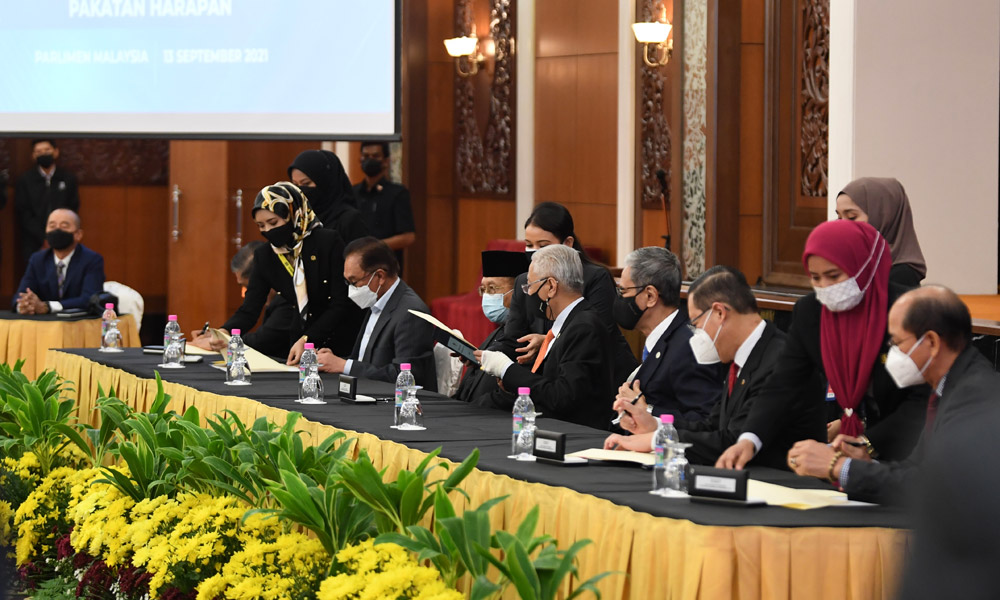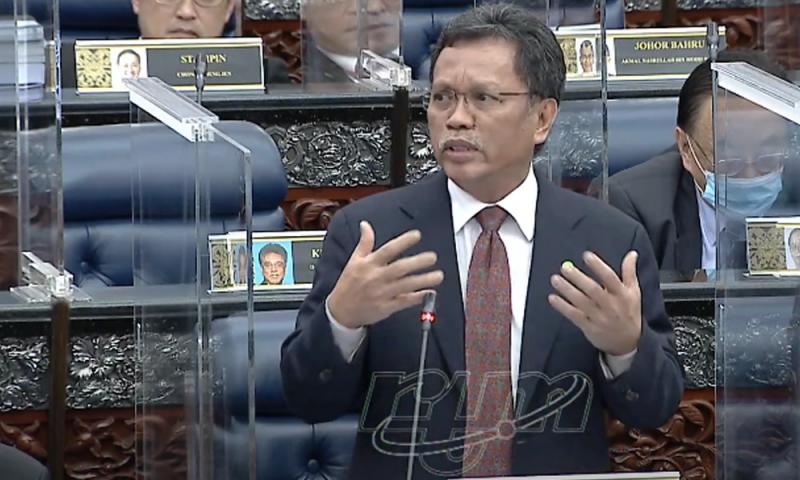LETTER | Shafie Apdal's 'values': Dividing the baby
LETTER | Semporna MP Mohd Shafie Apdal in castigating Pakatan Harapan for entering into the memorandum of understanding (MOU) with those who stole the people’s mandate reminds one of King’s Solomon’s judgment.
The first woman agreed to the king’s judgment to cut the baby into two so that each can have half. If she cannot have the baby then neither one should have him. The real mother, pleaded with the king not to kill the baby and was prepared to let the fake mother have the baby to save him.
Harapan, like the real mother, has put the people’s interests above its claim to the GE14 mandate to govern. For Harapan political stability, addressing the Covid-19 pandemic, economic recovery, saving lives and livelihoods take precedence.
Shafie’s (above) stance, like the first woman in King Solomon’s judgment, is to maintain the claim to govern, even if the baby dies in the process.
If Ismail Sabri Yaakob loses majority support, it will lead to further instability in the country and chances are the Parliament will be dissolved, just like what Shafie did when he lost his majority in Sabah Legislative Assembly.
A general election in the present Covid-19 pandemic will be disastrous. This will be a repeat of the pandemic that spread like wildfire throughout the country after the Sabah election.
In June 2020, Shafie chose to dissolve the state assembly rather than resign after his government collapse following defections. Is this the kind of “values” one should pursue?
Bargaining with the devil
The Harapan leadership in entering into the MOU has made the painful choice of foregoing the desire to punish those who wronged them in favour of pragmatism.
Given the fact that the country is facing an unprecedented national health crisis, economic recession and political chaos, at this juncture, the people’s interests are better served by choosing political stability and reforms.
Harapan’s dilemma in choosing to negotiate does not come close to that faced by Nelson Mandela. Mandela had for 23 years chosen imprisonment rather than negotiations with the South African apartheid government.
Mandela was fully aware that negotiating with the ruling National Party will be widely viewed as a sign of “weakness and betrayal.” However, the alternative to negotiations would have been continued oppression, violence and civil war with thousands killed and property destroyed. Mandela chose to negotiate with the devil.
In many instances, the rejection of negotiations is due to acting intuitively. It is emotions that dictate knee-jerk reactions to turn down the offer to talk to one’s opponents. It takes courage and clearheaded analysis to assess the realities of the offer to negotiate.
Often with the benefit of hindsight, a leader’s “Call to Battle” instead of a “Call for Peace” serves the leader’s own political interest rather than the people’s needs.
Ethics of compromise
Taking a stand against compromise may seem to be an admirable stance where it involves sacrificing strongly held core values. This argument, however, is not valid for the MOU.

No party is required to concede its principles or values. The parties’ respective needs are met through new and creative solutions by fairly agreed negotiations between parties of almost equal bargaining power.
The MOU provides for the various reforms to be implemented through empowering Parliament to function more effectively. Further, the MOU expressly preserves Harapan’s role, functions and responsibilities as opposition.
A compromise is good or bad depending on whether the compromise is an improvement over the status quo. It is undeniable the country will be worse off if there is no MOU.
As of Sept 20, there are 2,112,175 total confirmed Covid-19 cases, 23,744 total deaths.
The unemployment rate has shot up to 4.8 percent in June 2021, 30 percent of the shops in malls closed with 300,000 workers losing their jobs over the past 16 months, 580,000 businesses face closure by October 2021, the micro, small and medium enterprise sector is at the brink of collapse, there have been 1,708 suicide cases from 2019 to May 2021, the suicide rate has doubled from the 1.7 rate in 2020 amid the devastating Covid-19 lockdowns.
From the number of deaths due to Covid-19 alone, it is clear that the whole country has been facing the consequences of the pandemic akin to real warfare for more than a year.
The country cannot afford another round of the government avoiding a vote of confidence through postponement or suspension of Parliament sittings, ineffective pandemic controls and feeble economic recovery efforts.
Unethical not to compromise
In the face of the devastation, it will be unethical if not immoral not to compromise. Principled prudence must overcome the intransigence of those claiming to be standing on principles.
Not all agreements require compromises and not all compromises are bad. There are agreements which are in fact complementary of each party’s needs where no party is required to “give something up.” The MOU is such an arrangement.
There are certainly some arrangements which are “rotten compromises” which do great harm or injustice to one side and there are “devils” that one cannot bargain with.
However, before one condemns a compromise as bad, one needs to be able to distinguish between bad compromises and good compromises.
We should not compromise in order to preserve our integrity, basic principles and values. But we should compromise where it is intrinsically and pragmatically justified.
What is needed to discern between the two is wisdom, patience and tolerance. It may be worthwhile to take a step back to reflect that as a matter of human humility and fallibility, there is the possibility we may not always be the only one who is morally, politically or socially right.
The writer is head of the PKR Youth legal bureau.
The views expressed here are those of the author/contributor and do not necessarily represent the views of Malaysiakini.
RM12.50 / month
- Unlimited access to award-winning journalism
- Comment and share your opinions on all our articles
- Gift interesting stories to your friends
- Tax deductable
